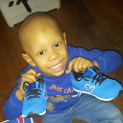Role of Kindlin-3 In Natural Killer Cell Mediated Tumor Killing

Background
While pediatric cancer survivor rates continue to improve, there are many children and young adults who still die from their diseases. Intensive chemotherapy regimens, radical surgeries and high-dose radiation continue to be used to induce remission, but many cancers remain refractory to conventional treatments. Additionally, for patients that survive their cancer the treatment side effects of these therapies can be devastating and even fatal. Researchers are now studying how to use a child's own immune system to fight cancer, known as immunotherapy. However, many cancers escape the immune system by hiding proteins from their cell surface. These proteins would normally trigger the immune system to respond and kill cancer cells.
Project Goal
Our work is focused on an important immune cell in the body known as natural killer (NK) cells. NK cells are unique because they can destroy cancer cells that attempt to escape the immune system by recognizing the absence of specific proteins on cancer cells. The mechanisms used by NK cells to identify and then destroy cancer cells are poorly understood. A rare immune deficiency with dysfunctional NK cells, Leukocyte Adhesion Deficiency Type III, identifies Kindlin-3 as a key protein in NK cells. By determining how NK cells use Kindlin-3, we will better understand how NK cells recognize cancer cells, signal the immune system and ultimately destroy tumors. Using Kindlin-3, we hope to unlock the potential of NK cells to develop a new immunotherapy with fewer side effects and more cures.
"I'm honored and excited to receive the Young Investigator Grant from Alex's Lemonade Stand Foundation and Northwestern Mutual. Harnessing our immune system has expanded the available treatments for childhood cancer. I firmly believe that we can develop safer and more effective therapies for children by understanding how our immune system recognizes and attacks cancer. The support from the Young Investigator Grant allows us to pursue that mechanism in Natural Killer cells through the window of a rare immune deficiency, Leukocyte Adhesion Deficiency Type III. Ultimately, we hope this understanding leads to the novel therapies and better outcomes for all patients. Also, this support is the critical launch for my goals to develop as a pediatric oncologist and researcher improving the lives of not only my patients, but all children with cancer." - Nathan Schloemer, MD

